Critical Analysis of Australia's Mandatory Detention Policy Report
VerifiedAdded on 2023/06/10
|8
|2037
|55
Report
AI Summary
This report provides a comprehensive analysis of Australia's Mandatory Detention Policy, examining its development, implementation, and evaluation within the framework of the public policy process. The report begins with an introduction to public policy and the policy process, outlining key phases such as agenda setting, policy formation, legitimation, implementation, evaluation, and maintenance. It then applies these concepts to the Mandatory Detention Policy, detailing the policy's origins, the factors that led to its formation, the legal processes of legitimation, and the implementation strategies. The report also evaluates the policy's impact, including the arguments for and against its effectiveness, and discusses any amendments or changes made over time. The report references relevant academic sources to support its analysis and concludes by summarizing the significance of the policy for Australia and its citizens.
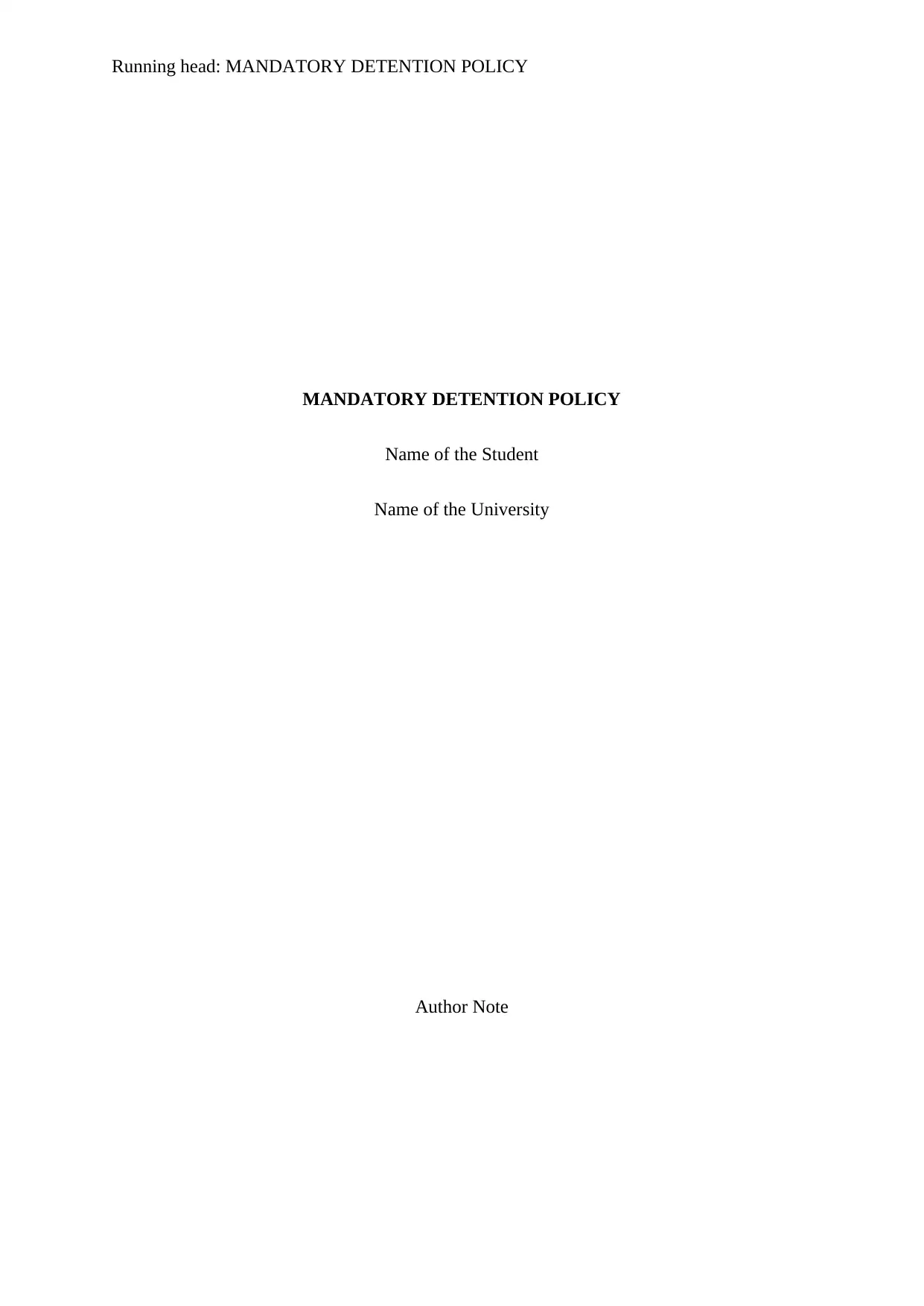
Running head: MANDATORY DETENTION POLICY
MANDATORY DETENTION POLICY
Name of the Student
Name of the University
Author Note
MANDATORY DETENTION POLICY
Name of the Student
Name of the University
Author Note
Paraphrase This Document
Need a fresh take? Get an instant paraphrase of this document with our AI Paraphraser
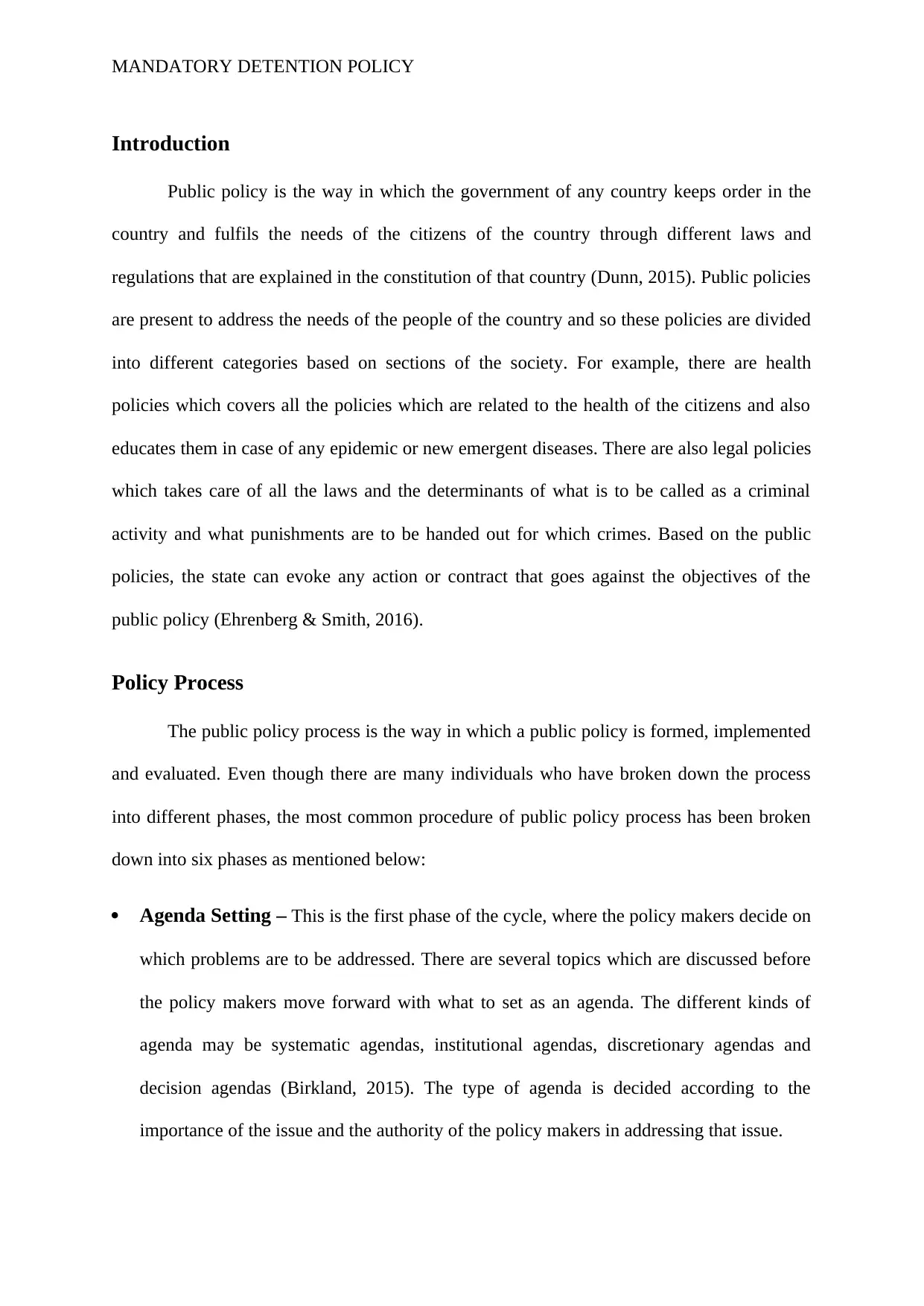
MANDATORY DETENTION POLICY
Introduction
Public policy is the way in which the government of any country keeps order in the
country and fulfils the needs of the citizens of the country through different laws and
regulations that are explained in the constitution of that country (Dunn, 2015). Public policies
are present to address the needs of the people of the country and so these policies are divided
into different categories based on sections of the society. For example, there are health
policies which covers all the policies which are related to the health of the citizens and also
educates them in case of any epidemic or new emergent diseases. There are also legal policies
which takes care of all the laws and the determinants of what is to be called as a criminal
activity and what punishments are to be handed out for which crimes. Based on the public
policies, the state can evoke any action or contract that goes against the objectives of the
public policy (Ehrenberg & Smith, 2016).
Policy Process
The public policy process is the way in which a public policy is formed, implemented
and evaluated. Even though there are many individuals who have broken down the process
into different phases, the most common procedure of public policy process has been broken
down into six phases as mentioned below:
Agenda Setting – This is the first phase of the cycle, where the policy makers decide on
which problems are to be addressed. There are several topics which are discussed before
the policy makers move forward with what to set as an agenda. The different kinds of
agenda may be systematic agendas, institutional agendas, discretionary agendas and
decision agendas (Birkland, 2015). The type of agenda is decided according to the
importance of the issue and the authority of the policy makers in addressing that issue.
Introduction
Public policy is the way in which the government of any country keeps order in the
country and fulfils the needs of the citizens of the country through different laws and
regulations that are explained in the constitution of that country (Dunn, 2015). Public policies
are present to address the needs of the people of the country and so these policies are divided
into different categories based on sections of the society. For example, there are health
policies which covers all the policies which are related to the health of the citizens and also
educates them in case of any epidemic or new emergent diseases. There are also legal policies
which takes care of all the laws and the determinants of what is to be called as a criminal
activity and what punishments are to be handed out for which crimes. Based on the public
policies, the state can evoke any action or contract that goes against the objectives of the
public policy (Ehrenberg & Smith, 2016).
Policy Process
The public policy process is the way in which a public policy is formed, implemented
and evaluated. Even though there are many individuals who have broken down the process
into different phases, the most common procedure of public policy process has been broken
down into six phases as mentioned below:
Agenda Setting – This is the first phase of the cycle, where the policy makers decide on
which problems are to be addressed. There are several topics which are discussed before
the policy makers move forward with what to set as an agenda. The different kinds of
agenda may be systematic agendas, institutional agendas, discretionary agendas and
decision agendas (Birkland, 2015). The type of agenda is decided according to the
importance of the issue and the authority of the policy makers in addressing that issue.
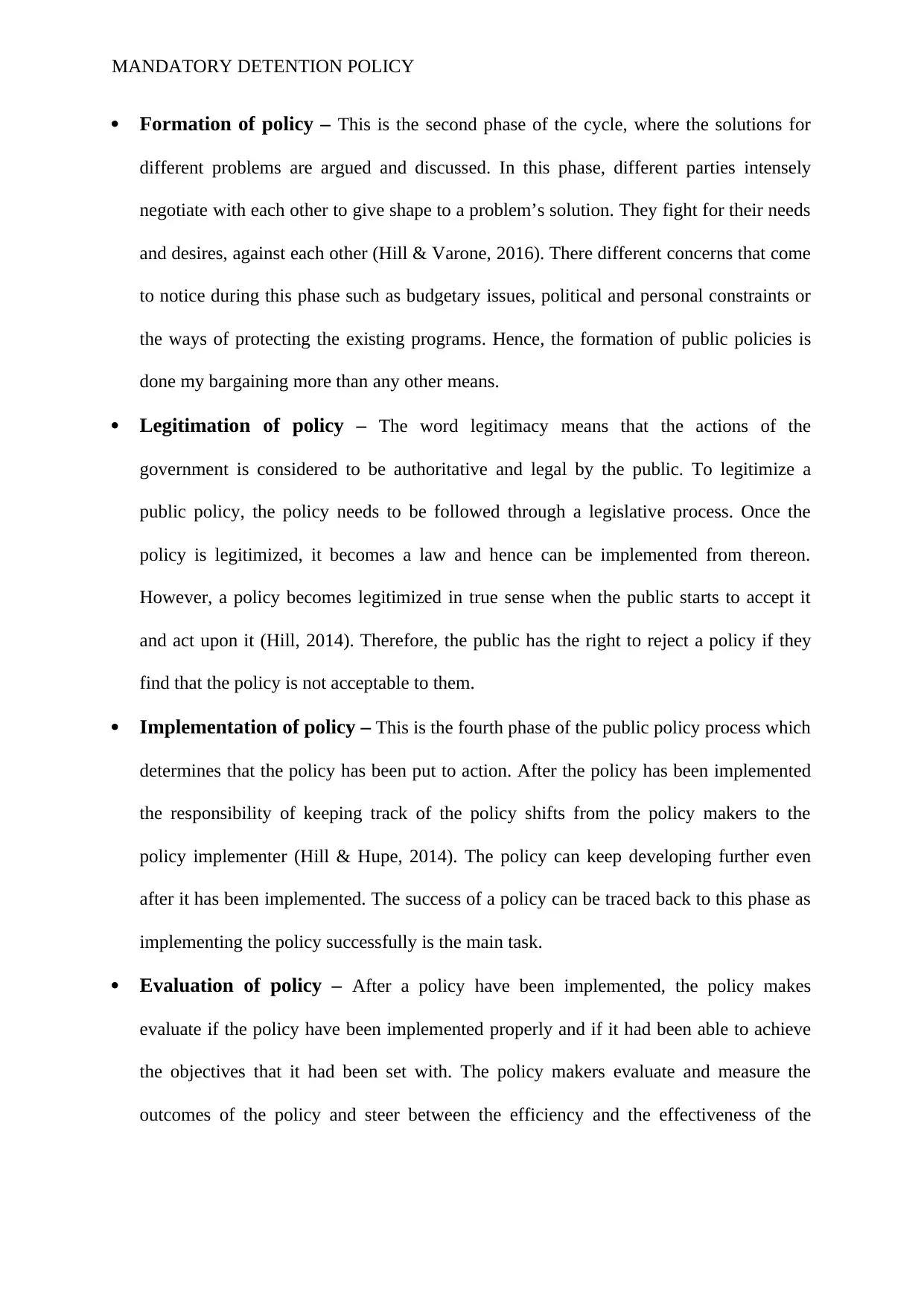
MANDATORY DETENTION POLICY
Formation of policy – This is the second phase of the cycle, where the solutions for
different problems are argued and discussed. In this phase, different parties intensely
negotiate with each other to give shape to a problem’s solution. They fight for their needs
and desires, against each other (Hill & Varone, 2016). There different concerns that come
to notice during this phase such as budgetary issues, political and personal constraints or
the ways of protecting the existing programs. Hence, the formation of public policies is
done my bargaining more than any other means.
Legitimation of policy – The word legitimacy means that the actions of the
government is considered to be authoritative and legal by the public. To legitimize a
public policy, the policy needs to be followed through a legislative process. Once the
policy is legitimized, it becomes a law and hence can be implemented from thereon.
However, a policy becomes legitimized in true sense when the public starts to accept it
and act upon it (Hill, 2014). Therefore, the public has the right to reject a policy if they
find that the policy is not acceptable to them.
Implementation of policy – This is the fourth phase of the public policy process which
determines that the policy has been put to action. After the policy has been implemented
the responsibility of keeping track of the policy shifts from the policy makers to the
policy implementer (Hill & Hupe, 2014). The policy can keep developing further even
after it has been implemented. The success of a policy can be traced back to this phase as
implementing the policy successfully is the main task.
Evaluation of policy – After a policy have been implemented, the policy makes
evaluate if the policy have been implemented properly and if it had been able to achieve
the objectives that it had been set with. The policy makers evaluate and measure the
outcomes of the policy and steer between the efficiency and the effectiveness of the
Formation of policy – This is the second phase of the cycle, where the solutions for
different problems are argued and discussed. In this phase, different parties intensely
negotiate with each other to give shape to a problem’s solution. They fight for their needs
and desires, against each other (Hill & Varone, 2016). There different concerns that come
to notice during this phase such as budgetary issues, political and personal constraints or
the ways of protecting the existing programs. Hence, the formation of public policies is
done my bargaining more than any other means.
Legitimation of policy – The word legitimacy means that the actions of the
government is considered to be authoritative and legal by the public. To legitimize a
public policy, the policy needs to be followed through a legislative process. Once the
policy is legitimized, it becomes a law and hence can be implemented from thereon.
However, a policy becomes legitimized in true sense when the public starts to accept it
and act upon it (Hill, 2014). Therefore, the public has the right to reject a policy if they
find that the policy is not acceptable to them.
Implementation of policy – This is the fourth phase of the public policy process which
determines that the policy has been put to action. After the policy has been implemented
the responsibility of keeping track of the policy shifts from the policy makers to the
policy implementer (Hill & Hupe, 2014). The policy can keep developing further even
after it has been implemented. The success of a policy can be traced back to this phase as
implementing the policy successfully is the main task.
Evaluation of policy – After a policy have been implemented, the policy makes
evaluate if the policy have been implemented properly and if it had been able to achieve
the objectives that it had been set with. The policy makers evaluate and measure the
outcomes of the policy and steer between the efficiency and the effectiveness of the
⊘ This is a preview!⊘
Do you want full access?
Subscribe today to unlock all pages.

Trusted by 1+ million students worldwide
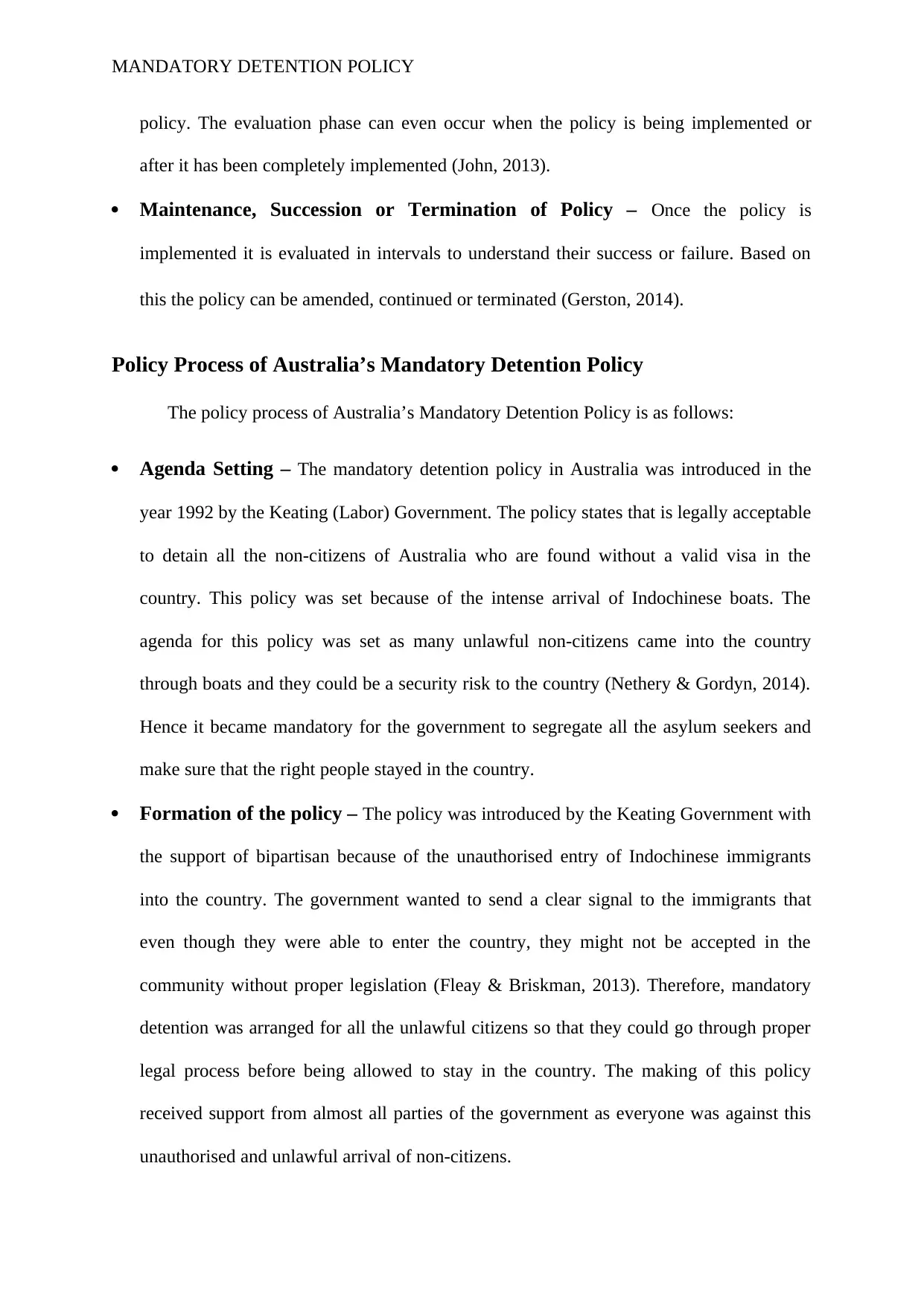
MANDATORY DETENTION POLICY
policy. The evaluation phase can even occur when the policy is being implemented or
after it has been completely implemented (John, 2013).
Maintenance, Succession or Termination of Policy – Once the policy is
implemented it is evaluated in intervals to understand their success or failure. Based on
this the policy can be amended, continued or terminated (Gerston, 2014).
Policy Process of Australia’s Mandatory Detention Policy
The policy process of Australia’s Mandatory Detention Policy is as follows:
Agenda Setting – The mandatory detention policy in Australia was introduced in the
year 1992 by the Keating (Labor) Government. The policy states that is legally acceptable
to detain all the non-citizens of Australia who are found without a valid visa in the
country. This policy was set because of the intense arrival of Indochinese boats. The
agenda for this policy was set as many unlawful non-citizens came into the country
through boats and they could be a security risk to the country (Nethery & Gordyn, 2014).
Hence it became mandatory for the government to segregate all the asylum seekers and
make sure that the right people stayed in the country.
Formation of the policy – The policy was introduced by the Keating Government with
the support of bipartisan because of the unauthorised entry of Indochinese immigrants
into the country. The government wanted to send a clear signal to the immigrants that
even though they were able to enter the country, they might not be accepted in the
community without proper legislation (Fleay & Briskman, 2013). Therefore, mandatory
detention was arranged for all the unlawful citizens so that they could go through proper
legal process before being allowed to stay in the country. The making of this policy
received support from almost all parties of the government as everyone was against this
unauthorised and unlawful arrival of non-citizens.
policy. The evaluation phase can even occur when the policy is being implemented or
after it has been completely implemented (John, 2013).
Maintenance, Succession or Termination of Policy – Once the policy is
implemented it is evaluated in intervals to understand their success or failure. Based on
this the policy can be amended, continued or terminated (Gerston, 2014).
Policy Process of Australia’s Mandatory Detention Policy
The policy process of Australia’s Mandatory Detention Policy is as follows:
Agenda Setting – The mandatory detention policy in Australia was introduced in the
year 1992 by the Keating (Labor) Government. The policy states that is legally acceptable
to detain all the non-citizens of Australia who are found without a valid visa in the
country. This policy was set because of the intense arrival of Indochinese boats. The
agenda for this policy was set as many unlawful non-citizens came into the country
through boats and they could be a security risk to the country (Nethery & Gordyn, 2014).
Hence it became mandatory for the government to segregate all the asylum seekers and
make sure that the right people stayed in the country.
Formation of the policy – The policy was introduced by the Keating Government with
the support of bipartisan because of the unauthorised entry of Indochinese immigrants
into the country. The government wanted to send a clear signal to the immigrants that
even though they were able to enter the country, they might not be accepted in the
community without proper legislation (Fleay & Briskman, 2013). Therefore, mandatory
detention was arranged for all the unlawful citizens so that they could go through proper
legal process before being allowed to stay in the country. The making of this policy
received support from almost all parties of the government as everyone was against this
unauthorised and unlawful arrival of non-citizens.
Paraphrase This Document
Need a fresh take? Get an instant paraphrase of this document with our AI Paraphraser
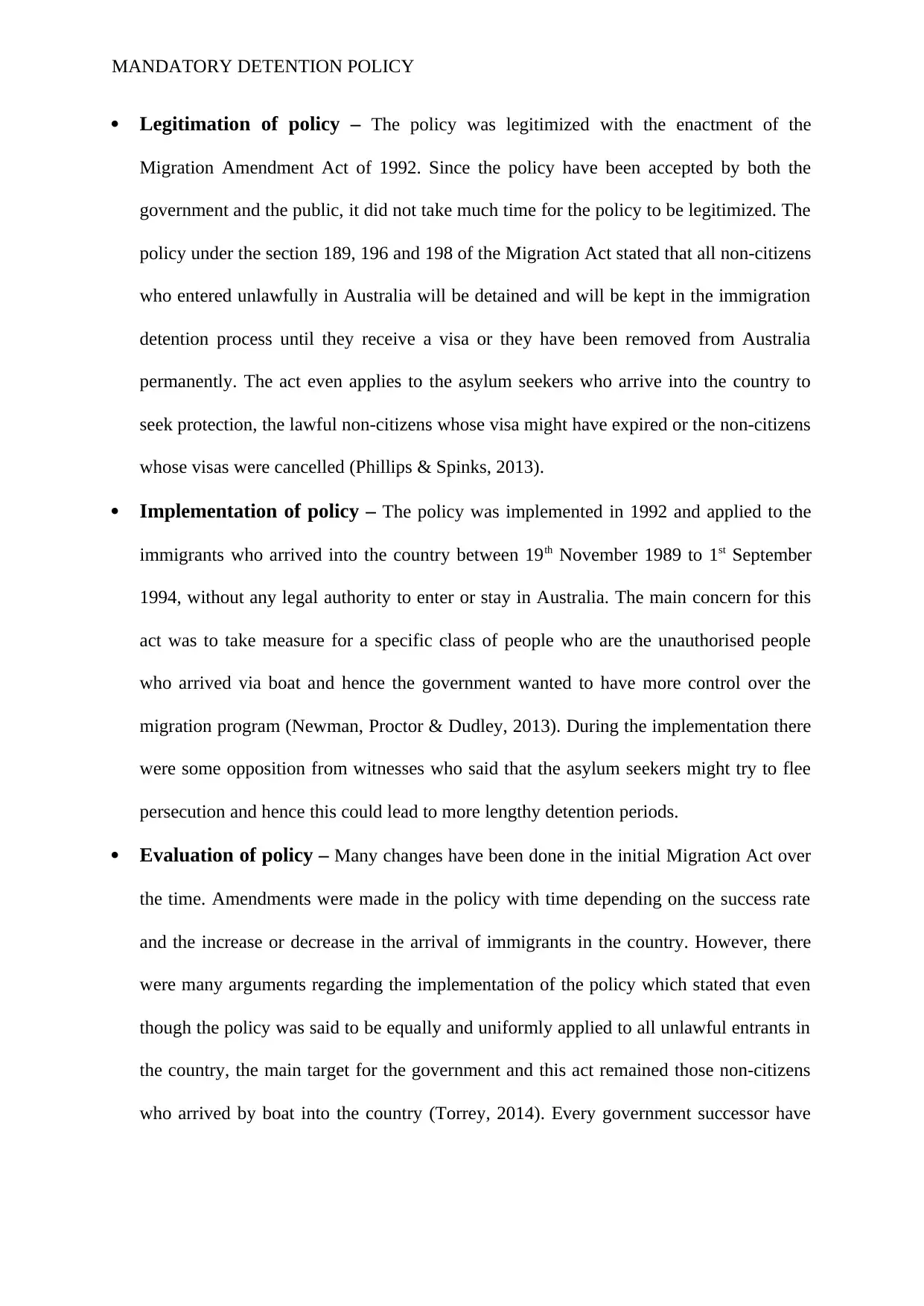
MANDATORY DETENTION POLICY
Legitimation of policy – The policy was legitimized with the enactment of the
Migration Amendment Act of 1992. Since the policy have been accepted by both the
government and the public, it did not take much time for the policy to be legitimized. The
policy under the section 189, 196 and 198 of the Migration Act stated that all non-citizens
who entered unlawfully in Australia will be detained and will be kept in the immigration
detention process until they receive a visa or they have been removed from Australia
permanently. The act even applies to the asylum seekers who arrive into the country to
seek protection, the lawful non-citizens whose visa might have expired or the non-citizens
whose visas were cancelled (Phillips & Spinks, 2013).
Implementation of policy – The policy was implemented in 1992 and applied to the
immigrants who arrived into the country between 19th November 1989 to 1st September
1994, without any legal authority to enter or stay in Australia. The main concern for this
act was to take measure for a specific class of people who are the unauthorised people
who arrived via boat and hence the government wanted to have more control over the
migration program (Newman, Proctor & Dudley, 2013). During the implementation there
were some opposition from witnesses who said that the asylum seekers might try to flee
persecution and hence this could lead to more lengthy detention periods.
Evaluation of policy – Many changes have been done in the initial Migration Act over
the time. Amendments were made in the policy with time depending on the success rate
and the increase or decrease in the arrival of immigrants in the country. However, there
were many arguments regarding the implementation of the policy which stated that even
though the policy was said to be equally and uniformly applied to all unlawful entrants in
the country, the main target for the government and this act remained those non-citizens
who arrived by boat into the country (Torrey, 2014). Every government successor have
Legitimation of policy – The policy was legitimized with the enactment of the
Migration Amendment Act of 1992. Since the policy have been accepted by both the
government and the public, it did not take much time for the policy to be legitimized. The
policy under the section 189, 196 and 198 of the Migration Act stated that all non-citizens
who entered unlawfully in Australia will be detained and will be kept in the immigration
detention process until they receive a visa or they have been removed from Australia
permanently. The act even applies to the asylum seekers who arrive into the country to
seek protection, the lawful non-citizens whose visa might have expired or the non-citizens
whose visas were cancelled (Phillips & Spinks, 2013).
Implementation of policy – The policy was implemented in 1992 and applied to the
immigrants who arrived into the country between 19th November 1989 to 1st September
1994, without any legal authority to enter or stay in Australia. The main concern for this
act was to take measure for a specific class of people who are the unauthorised people
who arrived via boat and hence the government wanted to have more control over the
migration program (Newman, Proctor & Dudley, 2013). During the implementation there
were some opposition from witnesses who said that the asylum seekers might try to flee
persecution and hence this could lead to more lengthy detention periods.
Evaluation of policy – Many changes have been done in the initial Migration Act over
the time. Amendments were made in the policy with time depending on the success rate
and the increase or decrease in the arrival of immigrants in the country. However, there
were many arguments regarding the implementation of the policy which stated that even
though the policy was said to be equally and uniformly applied to all unlawful entrants in
the country, the main target for the government and this act remained those non-citizens
who arrived by boat into the country (Torrey, 2014). Every government successor have
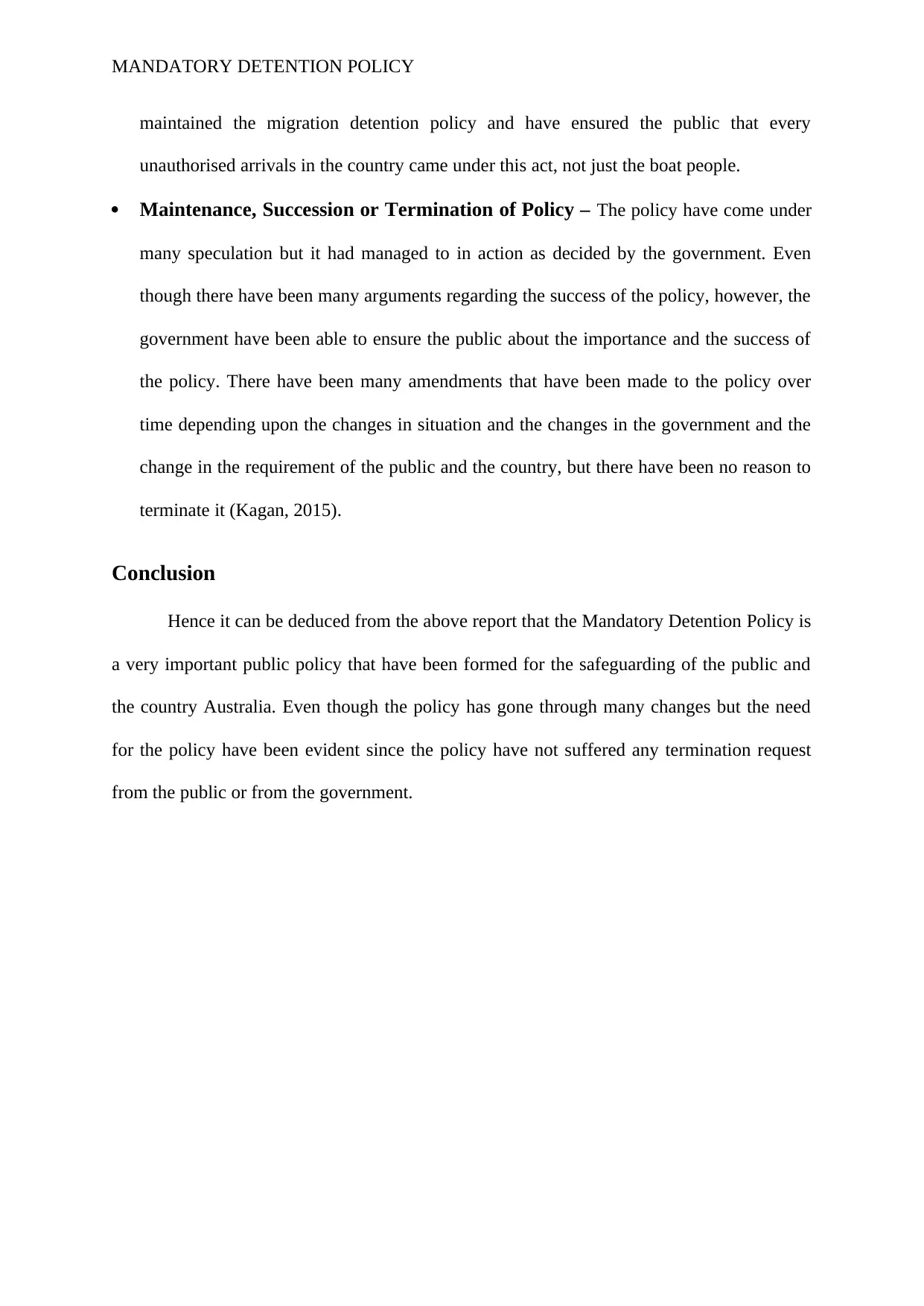
MANDATORY DETENTION POLICY
maintained the migration detention policy and have ensured the public that every
unauthorised arrivals in the country came under this act, not just the boat people.
Maintenance, Succession or Termination of Policy – The policy have come under
many speculation but it had managed to in action as decided by the government. Even
though there have been many arguments regarding the success of the policy, however, the
government have been able to ensure the public about the importance and the success of
the policy. There have been many amendments that have been made to the policy over
time depending upon the changes in situation and the changes in the government and the
change in the requirement of the public and the country, but there have been no reason to
terminate it (Kagan, 2015).
Conclusion
Hence it can be deduced from the above report that the Mandatory Detention Policy is
a very important public policy that have been formed for the safeguarding of the public and
the country Australia. Even though the policy has gone through many changes but the need
for the policy have been evident since the policy have not suffered any termination request
from the public or from the government.
maintained the migration detention policy and have ensured the public that every
unauthorised arrivals in the country came under this act, not just the boat people.
Maintenance, Succession or Termination of Policy – The policy have come under
many speculation but it had managed to in action as decided by the government. Even
though there have been many arguments regarding the success of the policy, however, the
government have been able to ensure the public about the importance and the success of
the policy. There have been many amendments that have been made to the policy over
time depending upon the changes in situation and the changes in the government and the
change in the requirement of the public and the country, but there have been no reason to
terminate it (Kagan, 2015).
Conclusion
Hence it can be deduced from the above report that the Mandatory Detention Policy is
a very important public policy that have been formed for the safeguarding of the public and
the country Australia. Even though the policy has gone through many changes but the need
for the policy have been evident since the policy have not suffered any termination request
from the public or from the government.
⊘ This is a preview!⊘
Do you want full access?
Subscribe today to unlock all pages.

Trusted by 1+ million students worldwide
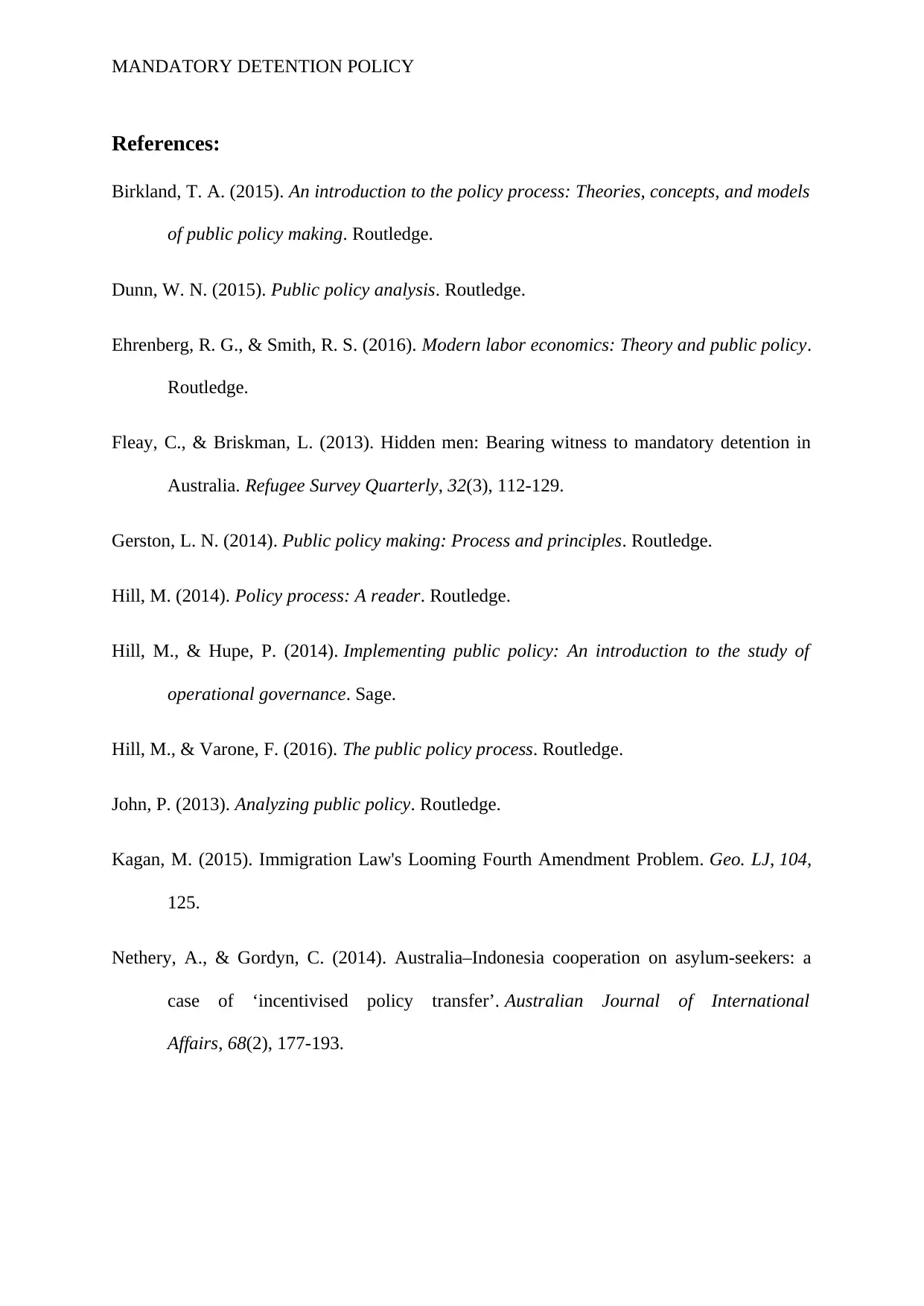
MANDATORY DETENTION POLICY
References:
Birkland, T. A. (2015). An introduction to the policy process: Theories, concepts, and models
of public policy making. Routledge.
Dunn, W. N. (2015). Public policy analysis. Routledge.
Ehrenberg, R. G., & Smith, R. S. (2016). Modern labor economics: Theory and public policy.
Routledge.
Fleay, C., & Briskman, L. (2013). Hidden men: Bearing witness to mandatory detention in
Australia. Refugee Survey Quarterly, 32(3), 112-129.
Gerston, L. N. (2014). Public policy making: Process and principles. Routledge.
Hill, M. (2014). Policy process: A reader. Routledge.
Hill, M., & Hupe, P. (2014). Implementing public policy: An introduction to the study of
operational governance. Sage.
Hill, M., & Varone, F. (2016). The public policy process. Routledge.
John, P. (2013). Analyzing public policy. Routledge.
Kagan, M. (2015). Immigration Law's Looming Fourth Amendment Problem. Geo. LJ, 104,
125.
Nethery, A., & Gordyn, C. (2014). Australia–Indonesia cooperation on asylum-seekers: a
case of ‘incentivised policy transfer’. Australian Journal of International
Affairs, 68(2), 177-193.
References:
Birkland, T. A. (2015). An introduction to the policy process: Theories, concepts, and models
of public policy making. Routledge.
Dunn, W. N. (2015). Public policy analysis. Routledge.
Ehrenberg, R. G., & Smith, R. S. (2016). Modern labor economics: Theory and public policy.
Routledge.
Fleay, C., & Briskman, L. (2013). Hidden men: Bearing witness to mandatory detention in
Australia. Refugee Survey Quarterly, 32(3), 112-129.
Gerston, L. N. (2014). Public policy making: Process and principles. Routledge.
Hill, M. (2014). Policy process: A reader. Routledge.
Hill, M., & Hupe, P. (2014). Implementing public policy: An introduction to the study of
operational governance. Sage.
Hill, M., & Varone, F. (2016). The public policy process. Routledge.
John, P. (2013). Analyzing public policy. Routledge.
Kagan, M. (2015). Immigration Law's Looming Fourth Amendment Problem. Geo. LJ, 104,
125.
Nethery, A., & Gordyn, C. (2014). Australia–Indonesia cooperation on asylum-seekers: a
case of ‘incentivised policy transfer’. Australian Journal of International
Affairs, 68(2), 177-193.
Paraphrase This Document
Need a fresh take? Get an instant paraphrase of this document with our AI Paraphraser
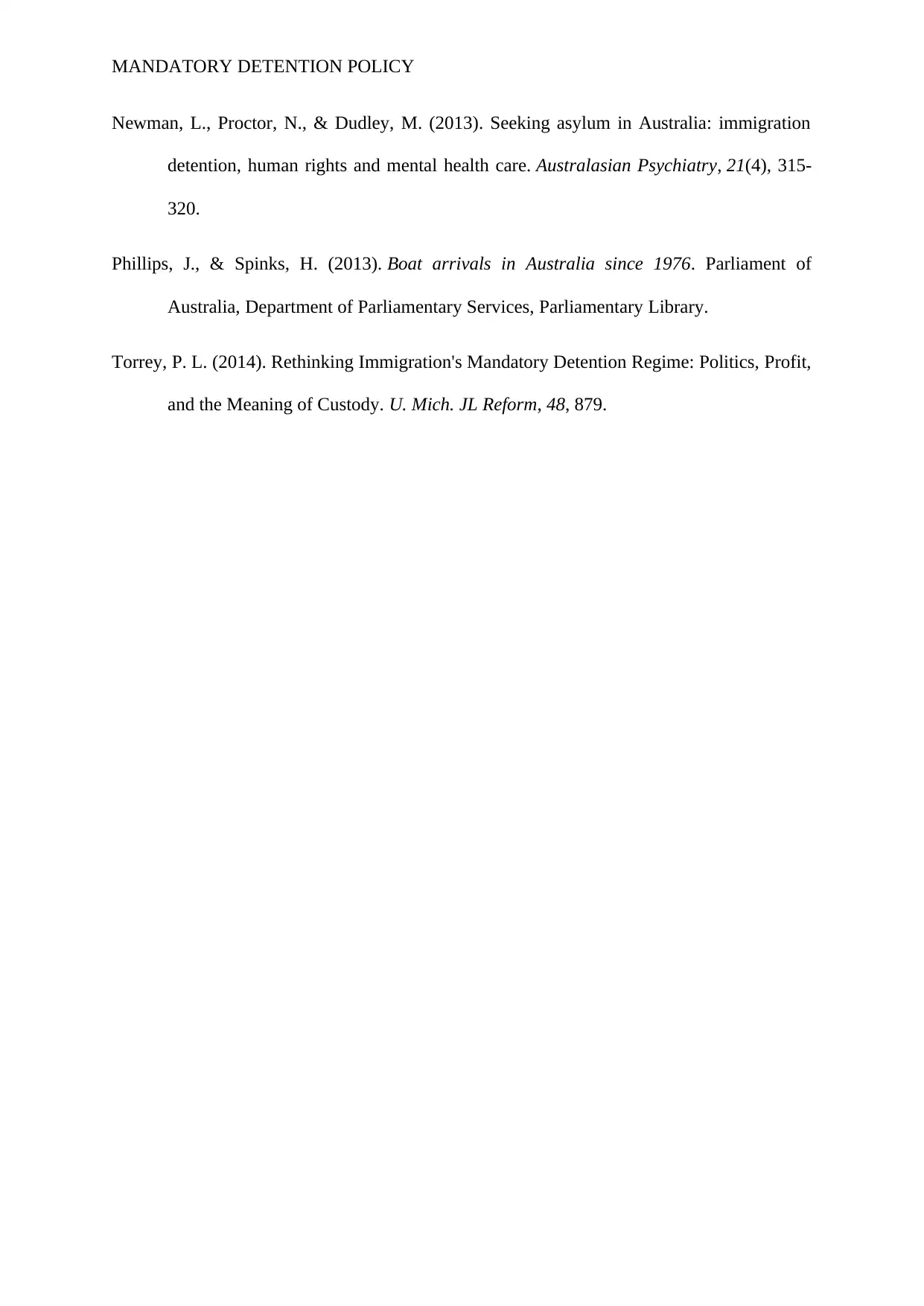
MANDATORY DETENTION POLICY
Newman, L., Proctor, N., & Dudley, M. (2013). Seeking asylum in Australia: immigration
detention, human rights and mental health care. Australasian Psychiatry, 21(4), 315-
320.
Phillips, J., & Spinks, H. (2013). Boat arrivals in Australia since 1976. Parliament of
Australia, Department of Parliamentary Services, Parliamentary Library.
Torrey, P. L. (2014). Rethinking Immigration's Mandatory Detention Regime: Politics, Profit,
and the Meaning of Custody. U. Mich. JL Reform, 48, 879.
Newman, L., Proctor, N., & Dudley, M. (2013). Seeking asylum in Australia: immigration
detention, human rights and mental health care. Australasian Psychiatry, 21(4), 315-
320.
Phillips, J., & Spinks, H. (2013). Boat arrivals in Australia since 1976. Parliament of
Australia, Department of Parliamentary Services, Parliamentary Library.
Torrey, P. L. (2014). Rethinking Immigration's Mandatory Detention Regime: Politics, Profit,
and the Meaning of Custody. U. Mich. JL Reform, 48, 879.
1 out of 8
Related Documents
Your All-in-One AI-Powered Toolkit for Academic Success.
+13062052269
info@desklib.com
Available 24*7 on WhatsApp / Email
![[object Object]](/_next/static/media/star-bottom.7253800d.svg)
Unlock your academic potential
Copyright © 2020–2026 A2Z Services. All Rights Reserved. Developed and managed by ZUCOL.





